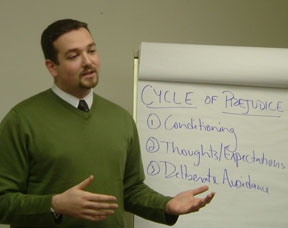|
|

| October 2005 Jonathan Zur (’03) and Neil Singh (’04) Advocate Religious Tolerance Both Jonathan Zur (’03) and Neil Singh (’04) recognized the pressing need for religious tolerance in the wake of 9/11. Zur, a Jew whose Lithuanian grandparents survived the Holocaust when most other family members perished, and Singh, a Sikh whose parents immigrated to the United States from India, knew only too well the damage religious prejudice can inflict. So they decided to take a proactive stance in educating the public about religious and racial tolerance. As a young adult, Zur played an active role in his temple in Howell, N.J., teaching Hebrew school and helping lead Saturday worship services. But he no longer attends temple and does not consider himself religious, a fact he attributed in part to his concerns about the ways in which people often use, or misuse, all types of religion to create dissent and strife. “I love the potential religion has to be a unifying force,” Zur said, “but I lament the way some groups of people use religion as a source of divisiveness. How can religion teach the values of respect and understanding?” Zur spent much of his college career trying to answer that question as well as the question of how to promote tolerance more broadly, including gender, sexual orientation, racial and ethnic tolerance. For example, he spent several summers volunteering with the New Jersey chapter of the National Conference for Community and Justice (NCCJ) on Anytown, a residential youth leadership program that encourages high school students to explore and celebrate diversity. Zur subsequently used the Anytown model to help the Chaplaincy, working in collaboration with NCCJ, develop a similar program for college students known as Collegetown. Collegetown held its first annual four-day retreat in January 2004 to rave reviews from students and staff alike. Zur also worked closely with the Chaplaincy on the Anti-Bias Project, another NCCJ initiative developed to address the bias, prejudice and discrimination experienced by South Asian, Muslim and Arab communities following the attacks of September 11. Ultimately the Anti-Bias Project led to the creation of A More Perfect Union (AMPU) in July 2003 with Zur, who had just graduated that May, as its director. AMPU, an inter-religious coalition in metro Richmond, attacked religious bias by developing educational programs for area schools, public service advertisements for television and a Web site dedicated to educating the public about different religions. After a one-year stint with AMPU, Zur accepted a position as a program manager with the New Jersey chapter of NCCJ. There he focuses his efforts on two major initiatives: the Youth Leadership Institute and the Center for Workplace Diversity.
Jonathan Zur leads a workshop on tolerance for the New Jersey chapter of NCCJ. The former initiative offers training and programming for high school and college students through programs such as Anytown New Jersey. The latter develops programming to address diversity issues in small- to medium-size businesses and nonprofits. Zur, for example, conceives of an idea for a diversity program, pitches the idea to the business or nonprofit, customizes the supporting curriculum, implements the program in the workplace and assesses the effectiveness of the program at its conclusion. According to Zur, most people support the work of the NCCJ, at least initially. “But as we dig deeper into various diversity issues, we begin to expose subtle discrimination,” Zur said. “It becomes more challenging when people have to think about their own responsibility.” Like Zur, Singh believes education is the best tool for combating prejudice and intolerance. Incidents of racial profiling and hate crimes against Sikhs rose sharply after 9/11, Singh said, because many Americans mistook Sikhs wearing turbans for Islamic terrorists. The media only exacerbated the confusion, Singh said, by displaying countless images of the turban-clad Taliban. But the overwhelming majority of Muslims, including Islamic terrorists, don’t wear turbans, Singh said. In fact, 99 percent of the people wearing turbans in the United States are Sikhs, he said. The Sikh American Legal Defense and Education Fund (SALDEF) took the lead in educating the American public about Sikhism. So Singh’s father approached SALDEF with his idea of printing pocket calendars containing some basic facts on Sikh Americans for distribution to the general public. SALDEF agreed to fund the project, and Singh’s father asked him to volunteer his time to implement it. SALDEF published the first pocket calendars in 2004, and Singh is currently working on the 2006 calendar, which will be available in Spanish as well as English, for the first time.
Singh oversaw the creation of this 2005 SALDEF pocket calendar.
But performing community service, one of Sikhism’s core values, is nothing new for Singh (pictured at left). During his senior year at University of Richmond, he co-founded the South Asian Student Alliance (SASA) to bring students from South Asia together and to educate the rest of the campus about South Asian culture. He also served as president of the University chapter of Habitat for Humanity for three-and-a-half years, turning what had been a stalled chapter into one of the most active, productive college chapters in the nation. Even though he is not currently volunteering for Habitat, Singh still spends a lot of time on construction sites, he said. He has been working as a project manager for Fine Painting, his father’s commercial painting contracting business, since graduation. Like his Sikh values, Singh’s education at Jepson reinforced his desire to volunteer, to make a difference in his community. “Jepson students learn to see the entire world,” Singh said. “We’re a small piece in a large puzzle. How do we make this small piece important?” |


